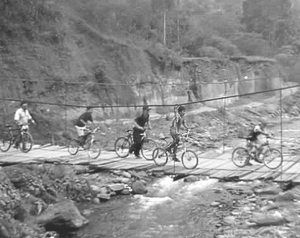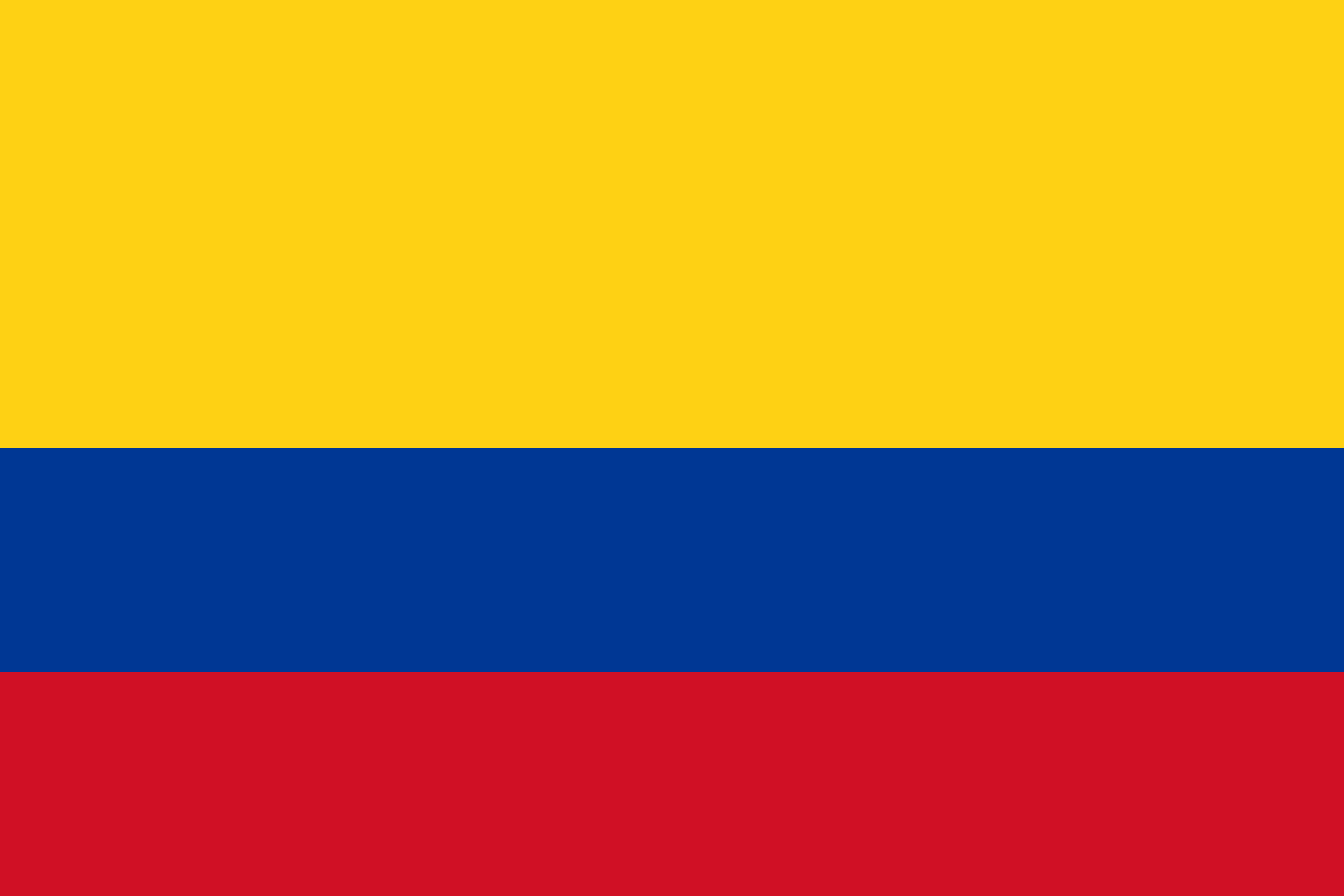Category Archives: Colombia
Regaining a Feeling of Freedom
2004 InGear
For six years, Reinel Oviedo sat in a Colombian prison at the foot of the Andean Mountains, about 90 miles west of the capital of Bogota, losing hope and gaining weight. Thanks to Pedals for Progress, however, Reinel is increasingly free to spend part of his day on two wheels, away from the jail’s intensely close confines, earning money for the day when he will regain his liberty.
 Reinel, and others like him at Colombia’s Picalea Prison, have earned work-release privileges to work for Horizons of Freedom Foundation (FHL) ‘Comp&Mail Messenger Service’. With bicycles provided by Pedals for Progress, inmates travel from the penitentiary to the service’s headquarters and from there to the service’s clients in the city of Ibagué. Reinel, who had nearly forgotten the freedom afforded by a bicycle, reports he has regained his sense of autonomy and self worth while earning an income. In his own words, “The benefits obtained have been many. Riding a bike has given me a feeling of liberty. My job has become almost a recreational activity. My physical condition has improved; the poundage put on by penitentiary food has been eliminated. Today I possess an athlete’s physique. I’ve had to abandon my earlier cigarette vice, and physical activity during the day allows me to sleep all night, without the nightmares of before. Also, I have benefited financially, cutting my transport costs”.
Reinel, and others like him at Colombia’s Picalea Prison, have earned work-release privileges to work for Horizons of Freedom Foundation (FHL) ‘Comp&Mail Messenger Service’. With bicycles provided by Pedals for Progress, inmates travel from the penitentiary to the service’s headquarters and from there to the service’s clients in the city of Ibagué. Reinel, who had nearly forgotten the freedom afforded by a bicycle, reports he has regained his sense of autonomy and self worth while earning an income. In his own words, “The benefits obtained have been many. Riding a bike has given me a feeling of liberty. My job has become almost a recreational activity. My physical condition has improved; the poundage put on by penitentiary food has been eliminated. Today I possess an athlete’s physique. I’ve had to abandon my earlier cigarette vice, and physical activity during the day allows me to sleep all night, without the nightmares of before. Also, I have benefited financially, cutting my transport costs”.
Pedals for Progress’s involvement with FHL goes back to the summer of 2002, when FHL’s founder and director, David Toro, approached P4P, requesting a container of bicycles. Toro, a former Picalea inmate, is a nationally-recognized ‘social entrepreneur’ and winner of a prestigious Ashoka Fellowship for social entrepreneurship. Since 2002, FHL has received two subsidized P4P shipments totalling about 900 bicycles. Besides using bicycles in its successful messenger business, FHL has launched a region-wide environmental awareness campaign centered on mass public bicycle rides, and has bartered surplus bicycles in return for training, accounting, and other services from sympathetic community development organizations.
Although FHL’s program’s have been successful, FHL is struggling financially, and is unable to bear the full costs of a third shipment. A principal reason FHL cannot pay the full cost of the third shipment of bicycles is Colombia’s Customs Regulations, which are onerous and costly. As David Toro reported following the arrival in port of P4P’s second container, “I tell you it is not easy. We have obtained the import license and duty-free exemption consent from the Ministry of Commerce and Trade, but with the Finance Ministry, it’s been much more difficult. A Finance Ministry delegation from Bogota visited us at our offices in Ibagué; they requested financial statements, income tax returns, loan documents, reports, etc. It went well, but all these things have delayed their giving us a decision on the tax exemption”. Furthermore, Colombian authorities require that—in exchange for partial tax exemption—FHL is prohibited from selling any bikes received, thus eliminating sales as a source of funds to pay for a subsequent shipment.
Finally, entering the country expeditiously requires a detailed inventory approved by Colombia’s Ministry of Finance prior to shipment. This requirement is easy for an importer of consecutively-numbered and uniform new bicycles originating with a manufacturer, but a practical impossibility for Pedals for Progress, owing to the variability of used bicycles and limited storage capacities. As a result of these import regulations, the shipment is delayed and additional costs are incurred for port storage, fines, additional container rental charges, and extra paperwork and staff time.
To overcome this constraint, and continue to support this exceptional program, Pedals for Progress is working with the State of Kansas’ Ellsworth Correctional Institute to recondition, inventory, and ship bicycles donated in Kansas to the Colombian program. Pedals for Progress is excited about promoting a prison-to-prison linkage, and about the potential psychological, vocational education, and income-generation benefits to traditionally marginalized population on both sides of the equator.
By enlisting the help of Ellsworth Correctional Institute, Pedals for Progress has been able to overcome Colombia’s onerous import regulations. Unlike Pedals for Progress, with its limited storage capacity and volunteer staff, Ellsworth has plenty of volunteers and space to inventory the bikes, prepare the detailed listing required by Colombian Custom Regulations, and can store the bicycles until Colombian Customs approves the inventory for shipment.
It is these types of creative relationships that have made Pedals for Progress successful.
It’s Better on a Bike! The CELA Bicycle Workshop-School
Summer/Fall 1999 InGear
As Latin America grapples with the inter-linked challenges of poverty, urbanization, and environmental deterioration, a new generation of citizen activists is arising within the market economies overseen by still-fragile democracies. A good example is the Centro de Asistencia Legal Ambiental (Center for Environmental Legal Aid—CELA), based in Cali, Colombia’s third-largest city, which in November 1998 received a grant from Pedals for Progress, Mediterranean Shipping Company, and the Friends of Colombia, of a 40-foot container of 392 used bikes, plus parts.
CELA, through the affiliate Asociación de Cicloamigos “Mi Bicicleta”, has long sponsored the “It’s Better on a Bike” campaign. As a logical and concrete extension of this public education and advocacy program in favor of bicycle transportation, CELA established a Bicycle Workshop-School, adjacent to its offices in Cali, to train youth apprentices in bicycle mechanics, repair, and assembly, and to offer bicycle sales, repair, and maintenance services to the public.
The sale of P4P-donated bicycles and parts generates funds to operate the training program, including salaries of the administrator/trainer and stipends for the apprentices, as well as a reserve fund to pay for subsequent P4P shipments, including international freight, customs duty, and inland transportation costs. Discounts on purchases are provided to members of the Asociación de Cicloamigos, and preference is given to those demonstrating use of the bicycle for daily transport and as a means for generating income.
Through the summer of 1999, CELA has sold the bulk of the P4P-donated bicycles and trained three apprentices, who will shortly return to their communities to set up their own independent businesses. CELA is engaged in discussions with other civic groups and municipalities to identify joint initiatives to build cycling infrastructure and otherwise advance the use of the bicycle as a means of transportation.
Unfortunately, Colombian customs authorities have not been as supportive of the CELA bicycle initiative as local elected officials, interpreting Colombian law to require payment by the group of upwards of $8,000 in import duties, value-added tax, storage charges, and in-country freight from the port inland to Cali. Given the unanticipated financial burden, CELA is uncertain as InGear goes to press whether it will be able to pay future international shipping charges and continue receiving support from Pedals for Progress. For P4P and its partners to succeed, governments must do their part and remove those trade restrictions, which often protect monopoly importers and are biased against the poor.

